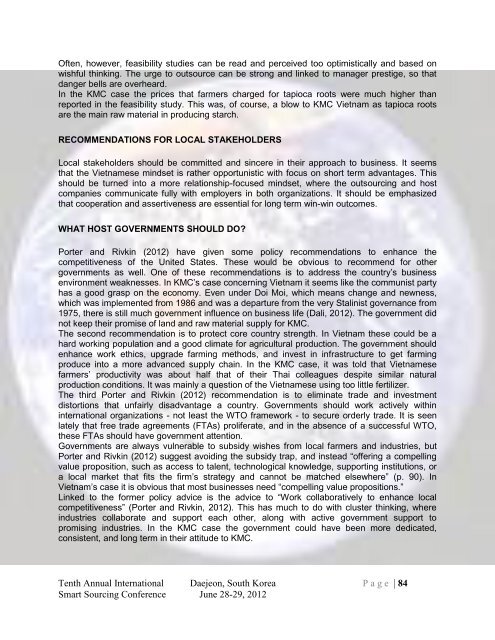of 3 - Center for Global Outsourcings
of 3 - Center for Global Outsourcings
of 3 - Center for Global Outsourcings
Create successful ePaper yourself
Turn your PDF publications into a flip-book with our unique Google optimized e-Paper software.
Often, however, feasibility studies can be read and perceived too optimistically and based on<br />
wishful thinking. The urge to outsource can be strong and linked to manager prestige, so that<br />
danger bells are overheard.<br />
In the KMC case the prices that farmers charged <strong>for</strong> tapioca roots were much higher than<br />
reported in the feasibility study. This was, <strong>of</strong> course, a blow to KMC Vietnam as tapioca roots<br />
are the main raw material in producing starch.<br />
RECOMMENDATIONS FOR LOCAL STAKEHOLDERS<br />
Local stakeholders should be committed and sincere in their approach to business. It seems<br />
that the Vietnamese mindset is rather opportunistic with focus on short term advantages. This<br />
should be turned into a more relationship-focused mindset, where the outsourcing and host<br />
companies communicate fully with employers in both organizations. It should be emphasized<br />
that cooperation and assertiveness are essential <strong>for</strong> long term win-win outcomes.<br />
WHAT HOST GOVERNMENTS SHOULD DO?<br />
Porter and Rivkin (2012) have given some policy recommendations to enhance the<br />
competitiveness <strong>of</strong> the United States. These would be obvious to recommend <strong>for</strong> other<br />
governments as well. One <strong>of</strong> these recommendations is to address the country’s business<br />
environment weaknesses. In KMC’s case concerning Vietnam it seems like the communist party<br />
has a good grasp on the economy. Even under Doi Moi, which means change and newness,<br />
which was implemented from 1986 and was a departure from the very Stalinist governance from<br />
1975, there is still much government influence on business life (Dali, 2012). The government did<br />
not keep their promise <strong>of</strong> land and raw material supply <strong>for</strong> KMC.<br />
The second recommendation is to protect core country strength. In Vietnam these could be a<br />
hard working population and a good climate <strong>for</strong> agricultural production. The government should<br />
enhance work ethics, upgrade farming methods, and invest in infrastructure to get farming<br />
produce into a more advanced supply chain. In the KMC case, it was told that Vietnamese<br />
farmers’ productivity was about half that <strong>of</strong> their Thai colleagues despite similar natural<br />
production conditions. It was mainly a question <strong>of</strong> the Vietnamese using too little fertilizer.<br />
The third Porter and Rivkin (2012) recommendation is to eliminate trade and investment<br />
distortions that unfairly disadvantage a country. Governments should work actively within<br />
international organizations - not least the WTO framework - to secure orderly trade. It is seen<br />
lately that free trade agreements (FTAs) proliferate, and in the absence <strong>of</strong> a successful WTO,<br />
these FTAs should have government attention.<br />
Governments are always vulnerable to subsidy wishes from local farmers and industries, but<br />
Porter and Rivkin (2012) suggest avoiding the subsidy trap, and instead “<strong>of</strong>fering a compelling<br />
value proposition, such as access to talent, technological knowledge, supporting institutions, or<br />
a local market that fits the firm’s strategy and cannot be matched elsewhere” (p. 90). In<br />
Vietnam’s case it is obvious that most businesses need “compelling value propositions.”<br />
Linked to the <strong>for</strong>mer policy advice is the advice to “Work collaboratively to enhance local<br />
competitiveness” (Porter and Rivkin, 2012). This has much to do with cluster thinking, where<br />
industries collaborate and support each other, along with active government support to<br />
promising industries. In the KMC case the government could have been more dedicated,<br />
consistent, and long term in their attitude to KMC.<br />
Tenth Annual International Daejeon, South Korea P a g e | 84<br />
Smart Sourcing Conference June 28-29, 2012



